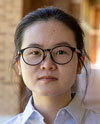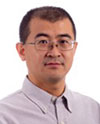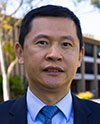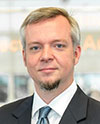Education
IEEE Distinguished IoT Webinars
The IEEE IoT Technical Community Steering Committee holds monthly webinars on topics that are beneficial to our members and the general public. We are happy to provide you with this program where you can expand your knowledge of IoT. You are most welcome to join us.
QoS-Aware Resource Allocation in Internet of Drones
Friday, 12 April 2024; 11:00am-12:00pm CDT; 12:00pm-1:00pm EDT
Presenter: Dr. Jingjing Yao, Assistant Professor in the Department of Computer Science at Texas Tech University, Lubbock, TX, USA
Abstract: The Internet of Drones (IoD) integrates drones with the Internet of Things system, enabling these aerial devices to autonomously collect, process, and share information for tasks ranging from surveillance and delivery to environmental monitoring. Despite its potential, the IoD faces challenges including the efficient utilization of limited computing and communication resources, battery conservation, and the protection of data privacy. Effective resource allocation stands as a key strategy in navigating these challenges, enabling the careful distribution of scarce resources to maximize network performance and ensure a high Quality of Service (QoS). This talk will highlight the role of technologies like deep reinforcement learning and federated learning in optimizing the allocation of computing and communication resources. These technologies are poised to overcome the drone battery limitations, boosting network reliability, efficiency, and data privacy in the process.
 Biography: Dr. Yao is an Assistant Professor in the Department of Computer Science at Texas Tech University, Lubbock, TX, USA. She earned her Ph.D. in Computer Engineering from the New Jersey Institute of Technology, Newark, NJ, USA. Dr. Yao's research is primarily focused on the Internet of Things, Internet of Drones, applied machine learning in communication and networking, federated learning, mobile edge computing/caching, cybersecurity, and energy harvesting. She has authored and co-authored numerous papers published in IEEE journals and conference proceedings. She is a founding member of the Space and Aerial Systems for Internet of Things (SAS-IoT) Working Group in the IEEE Internet of Things (IoT) Technical Community. She has been recognized through several awards, including the 2016 NJIT Fellowship, the 2021 Hashimoto Prize, and the 2024 Outstanding Dissertation Award.
Biography: Dr. Yao is an Assistant Professor in the Department of Computer Science at Texas Tech University, Lubbock, TX, USA. She earned her Ph.D. in Computer Engineering from the New Jersey Institute of Technology, Newark, NJ, USA. Dr. Yao's research is primarily focused on the Internet of Things, Internet of Drones, applied machine learning in communication and networking, federated learning, mobile edge computing/caching, cybersecurity, and energy harvesting. She has authored and co-authored numerous papers published in IEEE journals and conference proceedings. She is a founding member of the Space and Aerial Systems for Internet of Things (SAS-IoT) Working Group in the IEEE Internet of Things (IoT) Technical Community. She has been recognized through several awards, including the 2016 NJIT Fellowship, the 2021 Hashimoto Prize, and the 2024 Outstanding Dissertation Award.
View the Webinar Recording and Presentation
Random Access for Machine-to-Machine Communications: Challenges and Prospects
Friday, 15 March 2024; 8:00-9:00pm Hong Kong (GMT+8); 8:00-9:00am EST
Presenter: Dr. Lin Dai, Professor of Department of Electrical Engineering of City University of Hong Kong
Abstract: With the new wave of digital revolution, wireless communication networks are experiencing a radical paradigm shift from the conventional human-to-human (H2H) communications to machine-to-machine (M2M) communications. To facilitate the massive access of machine-type devices, random access is expected to play a crucial role in the next-generation M2M communications. Thanks to its distributed nature, random access has found wide applications to various wireless networks including 5G cellular networks and Wi-Fi networks.
In stark contrast to the wide applications, the theory of random access is much less developed. Analytical models are often tailored for specific performance metrics or access protocols, where differences in modeling assumptions and definitions have led to inconsistent findings. Despite continuous attention for half a century, fundamental issues remain unresolved. In this talk, I will start by reviewing the challenges of establishing a coherent theory of random access, and then introduce our recently proposed unified analytical framework for random access with case studies to show the practical implications of the analysis for the optimal access design of M2M communications. I will conclude the talk by highlighting the challenges and oportunities for the distributed access design of next-generation communication networks.
 Biography: Dr. Lin Dai received the Ph.D. degree from Tsinghua University, China. She is now a full professor of Department of Electrical Engineering of City University of Hong Kong. She has broad interests in communications and networking theory, with special interests in wireless communications. Her recent research work focuses on modeling, performance analysis and optimal access design of next-generation mobile communication systems. She was a co-recipient of the Best Paper Award at the IEEE WCNC 2007 and the IEEE Marconi Prize Paper Award in 2009. She received The President's Award of City University of Hong Kong in 2017.
Biography: Dr. Lin Dai received the Ph.D. degree from Tsinghua University, China. She is now a full professor of Department of Electrical Engineering of City University of Hong Kong. She has broad interests in communications and networking theory, with special interests in wireless communications. Her recent research work focuses on modeling, performance analysis and optimal access design of next-generation mobile communication systems. She was a co-recipient of the Best Paper Award at the IEEE WCNC 2007 and the IEEE Marconi Prize Paper Award in 2009. She received The President's Award of City University of Hong Kong in 2017.
View the Webinar Recording and Presentation
Advanced Digitalization of Industries: from Industrial IoT to Cloud/Fog Automation
Wednesday, 21 February 2024; 2:00 PM Stockholm, Sweden (8:00 AM EST)
Presenter: Dr. Zhibo Pang, Senior Principal Scientist, ABB Corporate Research Sweden and an Adjunct Professor, KTH Royal Institute of Technology, Sweden.
Abstract: Industrial IoT has been playing important roles in industry digitalization, going beyond the data collection and condition monitoring. Inspired by the fast evolution of 5G, cloud computing, and artificial intelligence, the manufacturing industry are looking for new generation automation systems that can be deployed on open, flexible, and IT-style communication and computing infrastructures. However, major technical challenges must be solved in terms of determinism before the expected benefits are achievable, especially for field level regulatory control. In this presentation, Dr. Pang will share what we have done towards the vision of doing field level regulatory control over cloud and fog computing and wireless networks. Dr. Pang will show the significant improvements in the latency and reliability of the latest wireless technologies such as 5G and WiFi6, as well as the insufficiencies to support the real-time control tasks. More importantly, our preliminary progress suggests, it will be much easier to solve the overall challenge if we can tune the control model according to the latency pattern of the networks. Despite its effectiveness in our specific use case, the generalizability of the proposed “latency-aware control” or “control-computing-communication co-design” is still a big research question. We hope to trigger more discussions on this topic by this talk.
 Biography: Dr. Zhibo Pang, MBA & PhD, is currently a Senior Principal Scientist at ABB Corporate Research Sweden, and Adjunct Professor at KTH. He is a Member of IEEE IES Industry Activities Committee, Vice-Chair of the TC on Cloud and Wireless Systems for Industrial Applications, and Co-Chair of the TC on Industrial Informatics. He is Associate Editor of IEEE TII, IEEE JBHI, and IEEE JESTIE. He was General Chair of IEEE ES2017, General Co-Chair of IEEE WFCS2021. He was awarded the “Inventor of the Year Award” by ABB Corporate Research Sweden, three times in 2016, 2018, and 2021 respectively. He works on enabling technologies in electronics, communication, computing, control, artificial intelligence, and robotics for Industry4.0 and Healthcare4.0.
Biography: Dr. Zhibo Pang, MBA & PhD, is currently a Senior Principal Scientist at ABB Corporate Research Sweden, and Adjunct Professor at KTH. He is a Member of IEEE IES Industry Activities Committee, Vice-Chair of the TC on Cloud and Wireless Systems for Industrial Applications, and Co-Chair of the TC on Industrial Informatics. He is Associate Editor of IEEE TII, IEEE JBHI, and IEEE JESTIE. He was General Chair of IEEE ES2017, General Co-Chair of IEEE WFCS2021. He was awarded the “Inventor of the Year Award” by ABB Corporate Research Sweden, three times in 2016, 2018, and 2021 respectively. He works on enabling technologies in electronics, communication, computing, control, artificial intelligence, and robotics for Industry4.0 and Healthcare4.0.
View the Webinar Recording and Presentation
When AI Meets IoT: Motivations, Challenges, and Applications
Friday, 15 December 2023; 9:00am-10:00am Sydney, Australia (GMT +11:00) (14 December 2023; 5:00pm-6:00pm EDT)
Presenter: Professor Wei Xiang, Cisco Research Chair of AI and IoT and Director of the Cisco-La Trobe Centre for AI and IoT at La Trobe University, Australia
Abstract: Artificial Intelligence of Things (AIoT) is a newly emerging technology that combines IoT and AI technologies to enable decision making and analytics at IoT devices. IoT enables networks of physical objects that are equipped with sensors, software, and other technologies to exchange data with other devices and systems over the internet, while AI enables data analytics and automated decision making. This talk will start with the motivations of combining AI and IoT technologies as well as the associated challenges. Then Prof. Wei Xiang will talk about his experience in setting up Australia’s first accredited IoT Engineering program at James Cook University, as well as establishing Australia’s only industry-sponsored research centre that specializes in synergizing between AI and IoT technologies at La Trobe University. Before concluding the talk, Prof. Wei Xiang will talk about a wide range of applications and use cases his AIoT Centre has been working on in Australia.
 Biography: Professor Wei Xiang is Cisco Research Chair of AI and IoT and Director of the Cisco-La Trobe Centre for AI and IoT at La Trobe University. Previously, he was Foundation Chair and Head of Discipline of IoT Engineering at James Cook University, Cairns, Australia. Due to his instrumental leadership in establishing Australia’s first accredited Internet of Things Engineering degree program, he was inducted into Pearcy Foundation’s Hall of Fame in October 2018. He is an elected Fellow of the IET in the UK and Engineers Australia. He received the TNQ Innovation Award in 2016, and Pearcey Entrepreneurship Award in 2017, and Engineers Australia Cairns Engineer of the Year in 2017. He was a co-recipient of four Best Paper Awards at WiSATS’2019, WCSP’2015, IEEE WCNC’2011, and ICWMC’2009. He has been awarded several prestigious fellowship titles. He was named a Queensland International Fellow (2010-2011) by the Queensland Government of Australia, an Endeavour Research Fellow (2012-2013) by the Commonwealth Government of Australia, a Smart Futures Fellow (2012-2015) by the Queensland Government of Australia, and a JSPS Invitational Fellow jointly by the Australian Academy of Science and Japanese Society for Promotion of Science (2014-2015). He was the Vice Chair of the IEEE Northern Australia Section from 2016-2020. He was an Editor for IEEE Communications Letters (2015-2017), and is currently an Associate Editor for IEEE Communications Surveys & Tutorials, IEEE Internet of Things Journal, IEEE Access, and Nature journal of Scientific Reports. He has published over 250 peer-reviewed papers including 3 books and 200 journal articles. He has severed in a large number of international conferences in the capacity of General Co-Chair, TPC Co-Chair, Symposium Chair, etc. His research interests include¬¬ the Internet of Things, wireless communications, machine learning for IoT data analytics, and computer vision.
Biography: Professor Wei Xiang is Cisco Research Chair of AI and IoT and Director of the Cisco-La Trobe Centre for AI and IoT at La Trobe University. Previously, he was Foundation Chair and Head of Discipline of IoT Engineering at James Cook University, Cairns, Australia. Due to his instrumental leadership in establishing Australia’s first accredited Internet of Things Engineering degree program, he was inducted into Pearcy Foundation’s Hall of Fame in October 2018. He is an elected Fellow of the IET in the UK and Engineers Australia. He received the TNQ Innovation Award in 2016, and Pearcey Entrepreneurship Award in 2017, and Engineers Australia Cairns Engineer of the Year in 2017. He was a co-recipient of four Best Paper Awards at WiSATS’2019, WCSP’2015, IEEE WCNC’2011, and ICWMC’2009. He has been awarded several prestigious fellowship titles. He was named a Queensland International Fellow (2010-2011) by the Queensland Government of Australia, an Endeavour Research Fellow (2012-2013) by the Commonwealth Government of Australia, a Smart Futures Fellow (2012-2015) by the Queensland Government of Australia, and a JSPS Invitational Fellow jointly by the Australian Academy of Science and Japanese Society for Promotion of Science (2014-2015). He was the Vice Chair of the IEEE Northern Australia Section from 2016-2020. He was an Editor for IEEE Communications Letters (2015-2017), and is currently an Associate Editor for IEEE Communications Surveys & Tutorials, IEEE Internet of Things Journal, IEEE Access, and Nature journal of Scientific Reports. He has published over 250 peer-reviewed papers including 3 books and 200 journal articles. He has severed in a large number of international conferences in the capacity of General Co-Chair, TPC Co-Chair, Symposium Chair, etc. His research interests include¬¬ the Internet of Things, wireless communications, machine learning for IoT data analytics, and computer vision.
View the Webinar Recording and Presentation
IoT for Rural and Extreme Environments
Friday, 10 November 2023; 9:00-10:00am EST
Presenter: Pietro Manzoni, Professor of Computer Engineering at the "Universitat Politècnica de València," Spain
Abstract: The Internet of Things (IoT) has the potential to collect real-time data from sensors, cameras, and other devices, making it beneficial for various applications. However, rural and extreme environments, such as remote areas, deserts, forests, or mountains, lack reliable communication infrastructure, presenting several technical challenges that must be overcome to successfully use IoT in such settings. These challenges include, for example, limited connectivity, data integration, data quality, security, interoperability, and energy efficiency. Addressing these technical challenges requires a multidisciplinary approach involving data science, computer engineering, and cybersecurity.
This talk will present some of the solutions explicitly being developed and deployed in the context of environmental intelligence, i.e., when IoT and digital technologies are used to gain insights into human impacts on the environment and develop strategies to mitigate or reverse the effects of climate change. The talk will present how edge computing and low power wide area networks (LPWAN) are used. Emphasis will be given to applying ML techniques to AI, usually referred to as AIoT, with novel techniques like TinyML.
 Biography: Pietro Manzoni is a computer engineering professor at the "Universitat Politècnica de València," Spain. He received a master's degree in Computer Science from the "Università degli Studi" of Milan, Italy, in 1989 and a Ph.D. in Computer Science from the "Politecnico di Milano," Italy, in 1995. From November 1992 to February 1993, he was an intern at Bellcore Labs, Red Bank, New Jersey, USA. From February 1994 to November 1994, he was a visiting researcher at the ICSI (International Computer Science Institute) Berkeley, California, USA.
Biography: Pietro Manzoni is a computer engineering professor at the "Universitat Politècnica de València," Spain. He received a master's degree in Computer Science from the "Università degli Studi" of Milan, Italy, in 1989 and a Ph.D. in Computer Science from the "Politecnico di Milano," Italy, in 1995. From November 1992 to February 1993, he was an intern at Bellcore Labs, Red Bank, New Jersey, USA. From February 1994 to November 1994, he was a visiting researcher at the ICSI (International Computer Science Institute) Berkeley, California, USA.
His research focuses on using Mobile Wireless Networks to create dynamic systems. Currently, he is developing solutions for the Internet of Things using LPWAN networks and Pub/Sub systems. These solutions have various applications, including environmental intelligence by integrating TinyML-based solutions, sustainable and green IoT, and Smart Tourism. Additionally, he is interested in exploring different aspects of network pluralism and finding ways to provide integrated connectivity in the edge-cloud continuum.
He is the coordinator of the [Computer Networks Research Group GRC)], a senior member of the IEEE, and a member of the [IEEE Technical Committee on Hyper-Intelligence], the [IEEE SIG on Metaverse], and the [ACM SIGCAS - Computers and Society].
View the Webinar Recording and Presentation
Event-Based Reinforcement Learning for Cyber-Physical Energy Systems – Smart Buildings, Smart Grid, and Smart Cities
Wednesday, 18 May 2022
Presenter: Professor Qing-Shan (Samuel) Jia, The Center for Intelligent and Networked Systems, Tsinghua University, Beijing, China
Abstract: Cyber-physical energy system (CPES) is where information and energy merge together to improve the overall system performance including economic, comfort, and safety aspects. Artificial intelligence which is enabled by internet of things (IoT), big data, and cloud computing, has a big role in the optimization of CPES. In this talk, we focus on event-based reinforcement learning (eRL) which makes decisions according to events instead of states. This method provides a scalable solution for large-scale multi-stage decision-making problems in which an accurate model may not be available. The performance of this method will be demonstrated by examples in smart buildings, smart micro-grid of buildings, and smart cities, and in particular on the problem of stochastic matching between the renewable power generation and the uncertain charging demand from the plug-in electric vehicles (PHEVs) in a city. We will also discuss extensions of this method to distributed optimization. We hope this work sheds light to the optimization of CPES.
 Biography: Qing-Shan Jia received a B.S. degree in automation in July 2002 and a Ph.D. degree in control science and engineering in July 2006, both from Tsinghua University, Beijing, China. He is a Full Professor in the Center for Intelligent and Networked Systems (CFINS), Department of Automation, Tsinghua University, where he currently serves as the associate director. He was the vice dean of Tsinghua Global Innovation eXchange (GIX) institute from 2016 to 2019 and the vice-chair of the Department of Automation at Tsinghua University from 2015 to 2018. He was a postdoc at Harvard University in 2006, a visiting scholar at the Hong Kong University of Science and Technology in 2010, and at Laboratory for Information and Decision Systems, Massachusetts Institute of Technology in 2013. His research interest is to develop an integrated data-driven, statistical, and computational approach to find designs and decision-making policies which have simple structures and guaranteed good performance. His work relies on strong collaborations with experts in manufacturing systems, energy systems, autonomous systems, and smart cities. He is currently the executive editor-in-chief of Results in Control and Optimization and an associate editor (AE) of Science China Information Sciences.
Biography: Qing-Shan Jia received a B.S. degree in automation in July 2002 and a Ph.D. degree in control science and engineering in July 2006, both from Tsinghua University, Beijing, China. He is a Full Professor in the Center for Intelligent and Networked Systems (CFINS), Department of Automation, Tsinghua University, where he currently serves as the associate director. He was the vice dean of Tsinghua Global Innovation eXchange (GIX) institute from 2016 to 2019 and the vice-chair of the Department of Automation at Tsinghua University from 2015 to 2018. He was a postdoc at Harvard University in 2006, a visiting scholar at the Hong Kong University of Science and Technology in 2010, and at Laboratory for Information and Decision Systems, Massachusetts Institute of Technology in 2013. His research interest is to develop an integrated data-driven, statistical, and computational approach to find designs and decision-making policies which have simple structures and guaranteed good performance. His work relies on strong collaborations with experts in manufacturing systems, energy systems, autonomous systems, and smart cities. He is currently the executive editor-in-chief of Results in Control and Optimization and an associate editor (AE) of Science China Information Sciences.
He was an AE of IEEE Transactions on Automatic Control (2015-2021), IEEE Control Systems Letters (2019-2021), IEEE Transactions on Automation Science and Engineering (2012-2017), and Discrete Event Dynamic Systems – Theory and Applications (2012-2016). He served as the Discrete Event Systems Technical Committee chair in IEEE Control Systems Society (2012-2015), and the co-chair for Smart Buildings Technical Committee in IEEE Robotics and Automation Society (2012-2021). He is currently the Control for Smart Cities Technical Committee chair of the International Federation of Automatic Control, and the Beijing Chapter Chair of IEEE Control Systems Society. He is a member of the 11th Chinese Automation Association Technical Committee on Control Theory (2018-2022) and the 1st Chinese Automation Association Technical Committee on Information Security of Industrial Systems (2016-2020).
View the Webinar Recording and Presentation
Industrial Real-time Communication from the Sensor to the Cloud in Converged Networks - OPC UA TSN
Wednesday, 15 September 2021
Presenter: Dietmar Brucker, B&R Industrial Automation
Abstract: The industrial communication market is dominated by Ethernet-based fieldbus systems. Although they share similar requirements and market segments, their implementations and ecosystems differ considerably. As a result, end customers and device manufacturers are faced with a multitude of technologies that need to be produced, run, diagnosed, maintained, and kept in stock. Although the availability of products and services is largely satisfactory, dealing with multiple solutions generates high costs and limits IoT capability and interoperability. This webinar introduces Open Platform Communication Unified Architecture Time-Sensitive Networking (OPC UA TSN) as a new technology and presents the current state of standardization and deployment. This time, the industrial prospects of fulfilling industrial communication requirements while leveraging the cost benefits of standard Ethernet hardware in the midterm are in reach. We anticipate that OPC UA TSN will reveal itself as a game changer in the field of industrial automation, being a candidate for establishing a holistic communication infrastructure from the sensor to the cloud.
 Biography: Dietmar Bruckner is with B&R Industrial Automation since 2013, where he is a unit manager in the RnD department System Software. He is responsible for the development (i) of a wide range of Industrial Connectivity solutions based on (real-time) Ethernet, and (ii) of the real-time operating system Automation Runtime for PC and PLC platforms. Before B&R, he worked as a University Assistant (i.e., Assistant Professor) at the Institute of Computer Technology of the Vienna University of Technology, managing research teams in the areas of field busses, building automation, and artificial intelligence.
Biography: Dietmar Bruckner is with B&R Industrial Automation since 2013, where he is a unit manager in the RnD department System Software. He is responsible for the development (i) of a wide range of Industrial Connectivity solutions based on (real-time) Ethernet, and (ii) of the real-time operating system Automation Runtime for PC and PLC platforms. Before B&R, he worked as a University Assistant (i.e., Assistant Professor) at the Institute of Computer Technology of the Vienna University of Technology, managing research teams in the areas of field busses, building automation, and artificial intelligence.
He studied Electrical Engineering, where he obtained an MSc in 2004 and a PhD in 2007 and passed both degrees with distinction.
Bruckner is a Senior Member of IEEE, and an IEEE IES AdCom member. He published ~70 reviewed scientific publications, and ~100 scientific publications in total as well as 5 international patents and edited the IEEE 61158 standard. He is actively involved in organizing international conferences, editing high ranked international journals (AE of TII, TIE, and IEM), and drafting international standards in the IEEE and OPC Foundation.
View the Webinar Recording and Presentation
How to Feed a Growing Population While Conserving the Planet's Resources – IoT to the Rescue
Wednesday, 11 August 2021
Presenter: Victor Grimblatt, R&D Group Director and General Manager at Synopsys, Chile
Abstract: The world population is growing and according to FAO (United Nations Food and Agriculture Organization), agriculture production should increase by 70% by 2050. On the other hand, it is also well known that agriculture is dramatically impacting the 9 planetary boundaries defined by Johan Rockström and his group in 2009. We are facing a big dilemma, how to improve the productivity of the soil without impacting the planet and its limits.
The growth of crops depends on several parameters such as soil moisture, soil temperature, nutrients (fertilizers), soil pH, soil salinity, etc. Without having an online measurement (real-time) of those parameters we will probably be able to get products from the ground, however, we are not taking into account the impact of what we are doing and the way we are making agriculture. With the appropriate sensors and IoT, we are able not only to know the level of the parameters already mentioned but also to act based on the results.
 Biography: Victor Grimblatt has an engineering diploma in microelectronics from Institut Nationale Polytechnique de Grenoble (INPG – France) and an electronic engineering diploma from Universidad Tecnica Federico Santa Maria (Chile). He is doing his PhD on IoT for Smart Agriculture at IMS lab, University of Bordeaux. He is currently R&D Group Director and General Manager of Synopsys Chile, leader in Electronic Design Automation (EDA). He opened the Synopsys Chile R&D Center in 2006. He has expertise and knowledge in business and technology and understands very well the trends of the electronic industry; therefore he is often consulted for new technological business development.
Biography: Victor Grimblatt has an engineering diploma in microelectronics from Institut Nationale Polytechnique de Grenoble (INPG – France) and an electronic engineering diploma from Universidad Tecnica Federico Santa Maria (Chile). He is doing his PhD on IoT for Smart Agriculture at IMS lab, University of Bordeaux. He is currently R&D Group Director and General Manager of Synopsys Chile, leader in Electronic Design Automation (EDA). He opened the Synopsys Chile R&D Center in 2006. He has expertise and knowledge in business and technology and understands very well the trends of the electronic industry; therefore he is often consulted for new technological business development.
He has published several papers in IoT, EDA and embedded systems development, and since 2007 he has been invited to several Latin American Conferences (Argentina, Brazil, Chile, Mexico, Peru and Uruguay) to talk about Circuit Design, EDA, IoT, and Embedded Systems. From 2006 to 2008 he was a member of the “Chilean Offshoring Committee” organized by the Minister of Economy of Chile. In 2010 he was awarded as “Innovator of the Year in Services Export”. In 2012 he was nominated to best engineer of Chile. He is also a member of several Technical Program Committees on Circuit Design and Embedded Systems. Since 2012 he is chair of the IEEE Chilean chapter of the CASS. He is also the President of the Chilean Electronic and Electrical Industry Association (AIE). Since 2021 he is a member of the IEEE CASS Board of Governors (CAS BoG).
Victor Grimblatt was professor of Electronics and IC Design in Universidad de Chile and Universidad de los Andes. He is currently lecturing a course IoT for Agriculture at Universidad Santo Tomas, Chile. Victor’s research areas are EDA (Electronic Design Automation), and Smart Agriculture applying Machine Learning, Artificial Intelligence, and IoT.
View the Webinar Recording and Presentation
Future Agriculture - Outlook of Photovoltaic Farm IoTs
Wednesday, 7 July 2021
Presenter: Professor Lei Shu, Professor at Nanjing Agricultural University, China and University of Lincoln, UK
Abstract: We believe that the "Photovoltaic Farm Internet of Things" will be the most effective management tool to achieve this new agricultural production mode - "Photovoltaic Farm", and it will also be a new research direction in the field of information technology, which integrates smart agriculture, sustainable energy, and Internet of Things.
 Biography: Lei Shu is currently a Professor with Nanjing Agricultural University, China, and a Lincoln Professor with the University of Lincoln, UK. He is also the Director of the NAU-Lincoln Joint Research Center of Intelligent Engineering. He was the vice-director of Guangdong Provincial Key Laboratory of Petrochemical Equipment Fault Diagnosis, China, 2013–2017. He received the B.S. degree in computer science from South Central University for Nationalities, China, in 2002, the M.S. degree in computer engineering from Kyung Hee University, South Korea, in 2005, and the Ph.D. degree from the Digital Enterprise Research Institute, National University of Ireland, Galway, Ireland, in 2010. He was a recipient of the 2014 Top Level Talents in Sailing Plan of Guangdong Province, China, the 2015 Outstanding Young Professor of Guangdong Province, the GLOBECOM 2010, ICC 2013, ComManTel 2014, WICON 2016, SigTelCom 2017 Best Paper Awards, the 2017, 2018 and 2020 IEEE Systems Journal Best Paper Awards, the 2017 Journal of Network and Computer Applications Best Research Paper Award, Outstanding Service Award of IUCC 2012, ComcomAP 2014, Outstanding Leadership Award of Healthcom 2017, the Outstanding Associate Editor Award of 2017, and the 2018 IEEE ACCESS.
Biography: Lei Shu is currently a Professor with Nanjing Agricultural University, China, and a Lincoln Professor with the University of Lincoln, UK. He is also the Director of the NAU-Lincoln Joint Research Center of Intelligent Engineering. He was the vice-director of Guangdong Provincial Key Laboratory of Petrochemical Equipment Fault Diagnosis, China, 2013–2017. He received the B.S. degree in computer science from South Central University for Nationalities, China, in 2002, the M.S. degree in computer engineering from Kyung Hee University, South Korea, in 2005, and the Ph.D. degree from the Digital Enterprise Research Institute, National University of Ireland, Galway, Ireland, in 2010. He was a recipient of the 2014 Top Level Talents in Sailing Plan of Guangdong Province, China, the 2015 Outstanding Young Professor of Guangdong Province, the GLOBECOM 2010, ICC 2013, ComManTel 2014, WICON 2016, SigTelCom 2017 Best Paper Awards, the 2017, 2018 and 2020 IEEE Systems Journal Best Paper Awards, the 2017 Journal of Network and Computer Applications Best Research Paper Award, Outstanding Service Award of IUCC 2012, ComcomAP 2014, Outstanding Leadership Award of Healthcom 2017, the Outstanding Associate Editor Award of 2017, and the 2018 IEEE ACCESS.
He has published over 400 papers in related conferences, journals, and books in the areas of sensor networks and Internet of Things. His current H-index is 62 and i10-index is 244 in Google Scholar Citation (more than 13400 times). He is a senior member of IEEE, IEEE IES, IEEE ComSoc, a member of ACM.
View the Webinar Recording and Presentation
AI-based Smart Cities Initiatives in Morocco
Wednesday, June 9, 2021
Presenter: Professor Mohamed Essaaidi, Head of the Smart Systems Lab and Former Dean, ENSIAS College of Engineering, Mohamed V University in Rabat
Chief of Party, Interactive Digital Center, Morocco Former Director International Coop. at Ministry of General Affairs & Governance, Morocco Founder & Former Chair of IEEE Morocco
Abstract: As is the case for many countries, Artificial Intelligence (AI) appears to be a priority for the Moroccan government owing to the wonderful and amazing benefits it brings to all kind of sectors and areas related with the country’s and its population activities and needs as well as to their performance. This is evidenced by several initiatives launched in Morocco during the last few years and which aim to harness the benefits of AI for all kind of areas and applications for Morocco and its citizens, such as:
- The funding of 45 applied research projects developed by universities, research institutions and start-ups over a period of three years, under Al-Khawarizmi AI Research Program Fund in all areas like industry, agriculture, health, education, mobility, energy, etc.
- The establishment of the International AI Center at Mohammed VI University.
- The launch of several start-ups developing AI based solutions and apps for areas as diverse as government, industry, education, health, mobility, smart cities, etc.
- The launch of training programs (e.g. M.Sc., M. Eng) in several universities throughout the country.
- The launch of Cities of Professions and Skills targeting to contribute to the training of AI human capital in the country at the level of TVET.
All these initiatives should have a strong impact on Morocco at different levels and in all kind of areas and sectors within the next few years.
 Biography: Mohamed Essaaidi, Prof. Dr. IEEE Senior Member, received the “Licence de Physique” degree, the “Doctorat de Troisième Cycle” degree and the “Doctorat d’Etat” degree in Electrical & Computer Engineering and with honors, respectively, in 1988, 1992 and 1997 from Abdelmalek Essaadi University in Tetuan, Morocco. He is a professor of Electrical & Computer Engineering and the Past Dean of ENSIAS College of Engineering and current Director of Smart Systems Lab of Mohammed V University in Rabat, Morocco. He is also the Chief of Part of Interactive Digital Center Morocco. He is also the founder and past chair of IEEE Morocco Section and Chair of IEEE ComSoc / Computer Morocco Chapter. He was co-organizer of IEEE Casablanca Core Smart City in 2016. He was the General Chair of Rabat Smart Cities Week 2020. He is also a member of 2021 HAC Assessment Committee and 2021 IEEE Teaching Excellence Hub Board. Prof. Essaaidi is involved in several initiatives related to Smart Cities in Morocco and within IEEE.
Biography: Mohamed Essaaidi, Prof. Dr. IEEE Senior Member, received the “Licence de Physique” degree, the “Doctorat de Troisième Cycle” degree and the “Doctorat d’Etat” degree in Electrical & Computer Engineering and with honors, respectively, in 1988, 1992 and 1997 from Abdelmalek Essaadi University in Tetuan, Morocco. He is a professor of Electrical & Computer Engineering and the Past Dean of ENSIAS College of Engineering and current Director of Smart Systems Lab of Mohammed V University in Rabat, Morocco. He is also the Chief of Part of Interactive Digital Center Morocco. He is also the founder and past chair of IEEE Morocco Section and Chair of IEEE ComSoc / Computer Morocco Chapter. He was co-organizer of IEEE Casablanca Core Smart City in 2016. He was the General Chair of Rabat Smart Cities Week 2020. He is also a member of 2021 HAC Assessment Committee and 2021 IEEE Teaching Excellence Hub Board. Prof. Essaaidi is involved in several initiatives related to Smart Cities in Morocco and within IEEE.
View the Webinar Recording and Presentation


